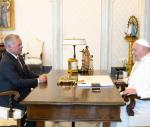You are here
Unity behind values builds a credible democracy
Nov 17,2018 - Last updated at Nov 17,2018
A judge in Washington, DC ordered the White House to return media credentials to CNN reporter Jim Acosta, reversing its decision to take punitive action against a journalist who challenged American President Donald Trump in what the latter described as a break away from “White House decorum”.
The decision came after CNN, emboldened by the open support it received from other media organisations, including some that reportedly are usually considered “cheerleaders” for the American president, took legal action to challenge the White House move. Regardless of where they fell on the political divide, US media outlets took a clear stand against what they saw as a challenge to their collective duty to safeguard “press freedoms”.
I know I do this all the time but I must link this incident to us here. And I am really going to ask of us to consider why we find it so difficult to defend a single national value above our own personal benefit or opinion. Why is it that our political affiliation, for example, immediately means obstructing the rights of the other? In fact, why is it that our origin, religion, age, gender, business interests and sometimes even our geographic location provide a justification for exclusion of others not like us?
And let me ask even further, why do we find it difficult to recognise and respect our rights as citizens and fulfil our collective and individual duty to safeguard those rights, regardless of whether we are directly involved or not?
The most obvious story this week is the debacle with the Momenoun Without Borders secretary general who is now facing criminal charges for apparently orchestrating the incident of his abduction to win state protection and popular sympathy.
Freedom of speech activists in Jordan had rallied to support the organisation, which after protestations from the Islamists bloc in parliament and their supporters, was denied permission to hold a workshop to discusses the history of religion. The government and the Islamist bloc were criticised for apparently colluding to deny academics the opportunity to dig deeper into philosophical questions around religion, questions that they argued mimic those raised freely by academics all over the world.
The freedom of speech argument was clear in this case. It is an argument that we all should have defended. It can be argued that the protesters could have organised themselves to deliver a counter argument within the same workshop or hosted an alternative gathering to put forward their own view on the subjects of discussion. The Islamist bloc and their supporters could have respected the right of academics to address philosophical discussions raised in the global world. The liberals could have framed the issue purely as an issue of freedom of speech rather than as an opportunity to feed and fuel a hatred of political Islamists.
All could have agreed that the government has no business or legal argument to act as guardian over the content of academic dialogue nor to take sides with one political view over the other. Most importantly, we all, and regardless of our political affiliation, should have agreed that the government should not have been lobbied to take one side, and in the process undermine our collective right to free speech.
The “right” to think or debate or discuss, which should have been the right that would be respected by all political parties had they been truly interested in furthering knowledge, winning support to their argument, building popular bases among Jordanians, or even just putting a stake in the floor that says this issue is a priority for us, was marginalised.
We all forgot that it was our primary “duty” to protect that right.
Instead, the whole incident was dragged and reduced to a bitter feud pitting “Islamists” in partnership with the government on one side against “liberals” on the other.
And it became clear from the quite divisive reactions on social media and among some intellectual circles, that we forgot the higher national good and succumbed, instead, to employing personal attack tactics that feed into a narrative of acrimony and personal denigration not only towards the organisation, but also to its supporters and opponents.
Today, this case has become more complicated, as the revelations by the police of the reported criminal actions of the secretary general will probably unravel multiple layers of intrigue that we are unaware of yet, and which will further deepen our mistrust not only of each other, but also of civil society, political parties, the law, the government and state institutions.
Ultimately the loss was our own collective loss because we were all derailed from the core issue of our political rights, values and duties as well as the more important objective of facilitating an enabling environment for credible legal political parties that can operate within a healthy democratic system based on institutional integrity and universal values.
What should have been a uniting issue, furthering democratic and citizenship standards, morals and ethics, a la the CNN story I started with in this column, ultimately highlighted the challenges ahead of us in achieving a consensus on the core values, upon which a democracy can be built and which can be safeguarded through relevant institutions governed by the rule of law.
The reportedly criminal actions of the secretary general of Momenoun Without Borders are truly shocking, and have compounded the damage from this case and dealt a heavy blow to democracy and democracy activists in Jordan who had believed and supported him.
The pathway to democracy in Jordan, sadly, has been further complicated by this incident and unless political will is articulated to commit to furthering democratic behaviour at all levels, it will continue to be challenged.













